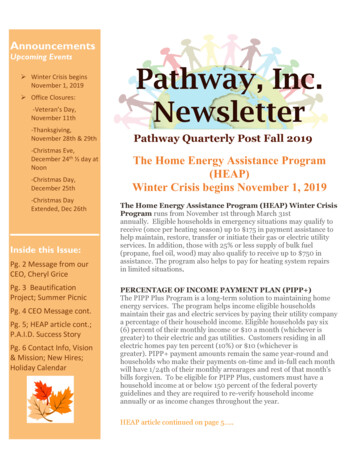
Transcription
AnnouncementsUpcoming Events Winter Crisis beginsNovember 1, 2019 Office Closures:-Veteran’s Day,November 11th-Thanksgiving,November 28th & 29th-Christmas Eve,December 24th ½ day atNoon-Christmas Day,December 25th-Christmas DayExtended, Dec 26thInside this Issue:Pg. 2 Message from ourCEO, Cheryl GricePg. 3 BeautificationProject; Summer PicnicPg. 4 CEO Message cont.Pg. 5; HEAP article cont.;P.A.I.D. Success StoryPg. 6 Contact Info, Vision& Mission; New Hires;Holiday CalendarPathway, Inc.NewsletterPathway Quarterly Post Fall 2019The Home Energy Assistance Program(HEAP)Winter Crisis begins November 1, 2019The Home Energy Assistance Program (HEAP) Winter CrisisProgram runs from November 1st through March 31stannually. Eligible households in emergency situations may qualify toreceive (once per heating season) up to 175 in payment assistance tohelp maintain, restore, transfer or initiate their gas or electric utilityservices. In addition, those with 25% or less supply of bulk fuel(propane, fuel oil, wood) may also qualify to receive up to 750 inassistance. The program also helps to pay for heating system repairsin limited situations.PERCENTAGE OF INCOME PAYMENT PLAN (PIPP )The PIPP Plus Program is a long-term solution to maintaining homeenergy services. The program helps income eligible householdsmaintain their gas and electric services by paying their utility companya percentage of their household income. Eligible households pay six(6) percent of their monthly income or 10 a month (whichever isgreater) to their electric and gas utilities. Customers residing in allelectric homes pay ten percent (10%) or 10 (whichever isgreater). PIPP payment amounts remain the same year-round andhouseholds who make their payments on-time and in-full each monthwill have 1/24th of their monthly arrearages and rest of that month'sbills forgiven. To be eligible for PIPP Plus, customers must have ahousehold income at or below 150 percent of the federal povertyguidelines and they are required to re-verify household incomeannually or as income changes throughout the year.HEAP article continued on page 5 .
2Our CEO’s MessageCommunity Livability is Far from What It Should Be:Our Young are an Endangered SpeciesIt is with a heavy heart that I write the opening message for this issue of ourNewsletter. We have been plagued since the summer with the loss of youngpeople who had a direct connection to Pathway. Most recently, Ms. Ector, ofour Workforce Development Department, lost her son to senseless gunviolence. I received a text message at 3:17 a.m. on Tuesday October 8thinforming me of the shooting and that she was at Toledo hospital.Ms. Ector’s son was 20 years old. He was gunned down in front of his home.In speaking with his mother, I learned that he was a good young man, notinvolved in illegal activity. He tried to be a peacemaker among his peers. Notonly will his death create a tremendous void in his family, but it robs all whosepaths might have crossed his, the opportunity to get to know a young man whohad tremendous potential and who wanted to enjoy a long and fruitful lifehelping others. He was a treasure.Unfortunately, his death is not the only one we have experienced recently.Since mid-summer our Brother’s United (BU) Fatherhood Program has lost 4participants to violence. In BU, a program participant learns how to be anoutstanding dad as well as how to work collaboratively with his co-parent inraising their child or children. These dads were on the right path, trying toimprove their lives and the lives of their children but their lives were cut shortby violence. They leave behind their children who are now fatherless.This ongoing senseless loss of life in our community must stop. We have tofind ways for our young people to avoid situations that will cost them theirlives. Each child that is born deserves the opportunity to enjoy a safe,productive and long life.Research indicates youth who join gangs for example, do so for a variety ofreasons. There are several risk factors or circumstances that youth are eitherborn into or find themselves in that contribute to them seeking membership ingangs. According to the Safe Communities Task Force Research, the riskfactor categories include individual, family, school, peer and community.Community Livability Article continued on page 4
3Pathway, Inc. employees participated in a Clean up day for theCDBG Grant Beautification Project in September. A HUGE thank yougoes out to all of the volunteers for taking their time to helpclean up! We could not have done it without so many volunteers!Pathway Inc. Employees Summer PicnicOn August 23, 2019, Pathway employees held their annual All-Staff Summer Picnic.It was a beautiful day out and fun was had by all!!!
4Community Livability Continued from page 2 .Individual risk factors include risky behaviors, antisocial beliefs, negative life events, andvictimization. Family risk factors include lack of consistent rules or discipline, changes inguardianship or caretaker, unrestricted access to friends, and lack of parental control oroversight. School risk factors include low academic aspiration, low school or teacherattachment, suspension or expulsion, and victimization or alienation. Peer risk factors includefriends or relatives are gang members, association with antisocial, aggressive or otherwisedelinquent peers. Community risk factors include poverty or disorganization, high crime rates,lack of services or access to resources, segregation and marginalization. Any combination ofthese risk factors may contribute to young people deciding to engage in criminal activity.Given that19.8 percent of Lucas County residents live in poverty according to U.S. Censusstatistics, we are likely seeing the adverse impact of the community risk factors in Toledo.Pathway is gathering data on the programs and services in Lucas County that are designed toprevent violence in an effort to see if there are any gaps that Pathway and other human servicesagencies might address.I am appalled at the number of violent crimes that are committed in Toledo by young people. Iam more concerned that the number of deaths resulting from gun violence is growing. Since thebeginning of the year according to “areavibes” an online source that provides “Livability Scores”for cities across the country, there have been 35 murders and 2,649 violent crimes includingmurder, robbery, and assault in Toledo. Crime in Toledo is 81% higher than the United Statesaverage.Toledo’s overall livability score is only 63 out of a possible 100. Closely located cities (within10 miles) i.e., Perrysburg, Sylvania and Ottawa Hills all have livability scores of 86 andMaumee’s livability score is 85. Factors included in livability are household income, income percapita, unemployment, median home value, median rent price, home ownership, high schoolgraduation rate, school test scores, student teacher ratio, cost of living, total crime and chance ofbeing a crime victim.We have to improve the livability of our City in order to see the other factors improve. Aftermeeting with public officials and having discussions with other key community stakeholders,Pathway will look at the role it should play in trying to shift the community paradigm for youngpeople so that they have the opportunity to thrive.
5HEAP article continued from page 1 .REGULAR HEAPThe Regular HEAP Program provides a one-time HEAP benefit to income eligible households and isapplied as a direct credit to your main source of heat or fuel vendor. The amount of your benefit willvary and is dependent upon federal funding levels, how many people live with you, total householdincome, and the primary fuel you use to heat your home. HEAP benefits do not cover monthly utilitybills unless you have a zero balance on your utility account. Households residing in federallysubsidized housing where the heat is included in the rent are not eligible for the regular component ofthe HEAP program. The Pathway offices hours are 8:00 AM to 5:00 PM.Make an appointment by calling Toll free – 1-866-504-7392 Please remain on the line for your confirmation number The Walk-in Process: Wednesdays & Thursdays ONLY Call and you can be seen the same-day as a walk-in.Households must call the HEAP hotline at 1-844-493-1199 between 8 AM to 11 AM in orderto receive a same-day walk-in slot. Same-day slots are between 1:00 PM and 3:30 PM.Apply online for the Ohio Energy Assistance Programs from July 1,2019 thru March 31, 2020. You may now re-certify your HEAP andPIPP application online. Visit -------------------------------P.A.I.D. Success StoryDemetria Massengil, a single mother, was interestedin receiving support to obtain her full LicensedPractical Nurse credential.Ms. Massengil had completed courses at theProfessional Skills Institute (PSI) to become aLicensed Practical Nurse in May 2019. She neededassistance to cover the cost of the NCLEX exam.Demetria graduated the P.A.I.D. program in July2019 while continuing her employment. Afterworking for more than 30 days and proving she hadjob retention, the P.A.I.D. program staff reviewedher need for further assistance. At the end ofAugust, Pathway paid the full cost of the exam,which was 200.The client took the exam and was awarded herlicense on September 17, 2019. She will now moveforward to apply for LPN positions and PathwayCareer Coaches will assist and track her progress.Pathway, Inc. will be a partnerwith the United States CensusBureau for the upcoming 2020Census. More informationcoming soon. Go to2020census.gov to learn more!
6Contact UsWelcome, New Hires:Pathway, Inc.505 Hamilton St.Representative Khaled Abuajameia, Case Manager Jeremy Kelly, Office Aide Jenna Oliver, Emergency AssistanceToledo, OH 43604(419) 242-7304 David Oxner Jr., Transportation Coordinator Raquel Rodriguez, Emergency Assistancewww.pathwaytoledo.orgRepresentative Nicole Russell, Emergency AssistanceRepresentativeOUR VISION:To reduce poverty by inspiring hopeand delivering services to those whoseek self-sufficiency.OUR MISSION:PATHWAY reduces poverty byproviding comprehensive services thatcreate pathways to self-sufficiency.PATHWAY, INC. OBSERVED HOLIDAYS2020-Wednesday, January 1: New Year’s Day-Thursday, January 2: New Year’s (extended)-Monday, January 20: Martin Luther King, Jr. Day-Monday, February 17: President’s Day-Friday, April 10: Good Friday-Monday, May 25: Memorial Day-Friday, July 3: Independence Day-Monday, September 7: Labor Day-Monday, October 12: Columbus Day-Wednesday, November 11: Veterans Day-Thursday, November 26: Thanksgiving Day-Friday, November 27: Thanksgiving (extended)-Thursday, December 24: ½ Day-Christmas Eve-Friday, December 25: Christmas Day-Thursday, December 31: ½ Day-New Year’s Eve
in receiving support to obtain her full Licensed Practical Nurse credential. Ms. Massengil had completed courses at the Professional Skills Institute (PSI) to become a Licensed Practical Nurse in May 2019. She needed assistance to cover the cost of the NCLEX exam. Demetria graduated the P.A.I
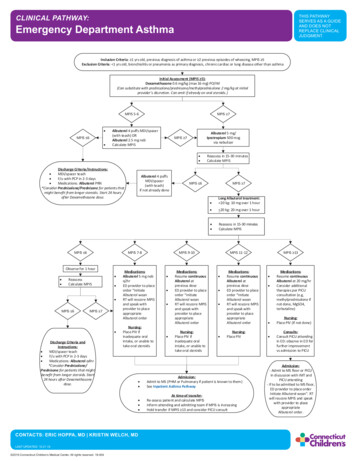
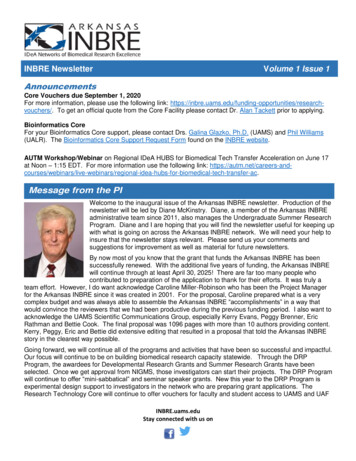



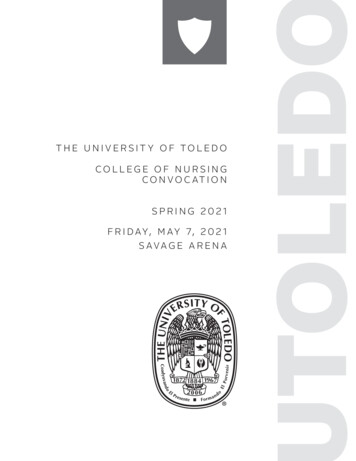
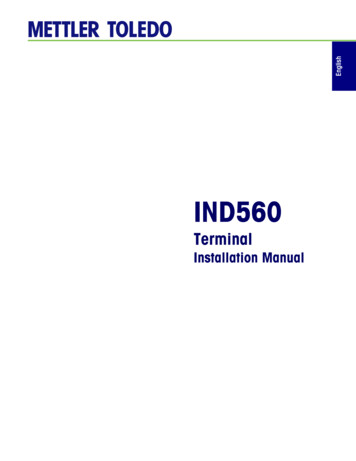

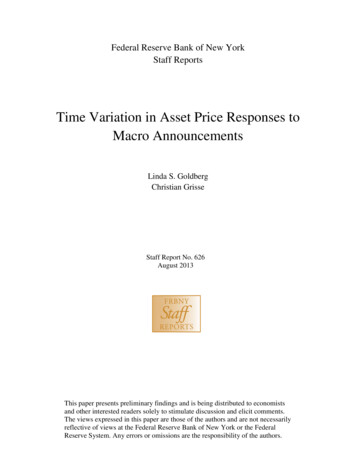
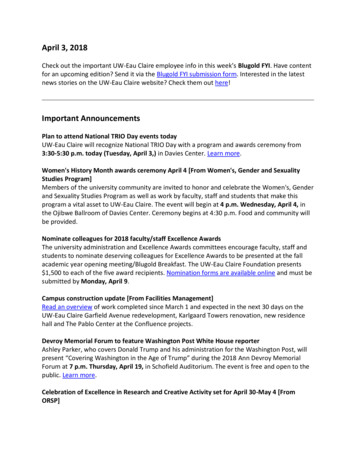
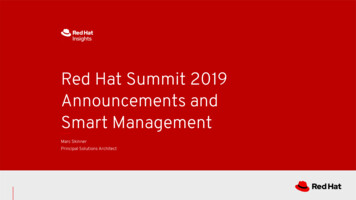
![THS Announcements.ppt [Read-Only]](/img/10/ths-20announcements44.jpg)